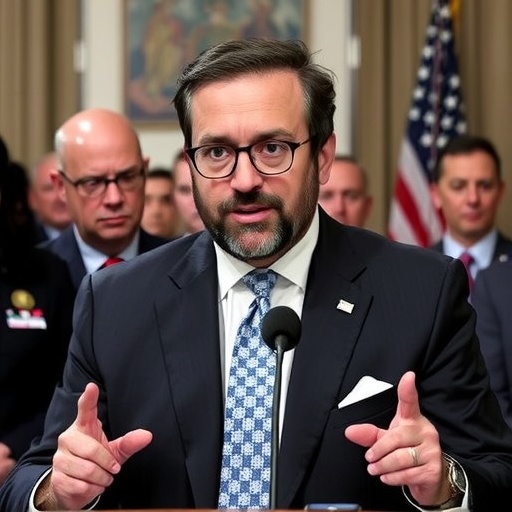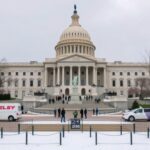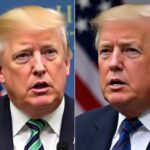Jack Smith Pushes for Open Congressional Hearings on Trump Investigations Amid Legal Tensions
In a bold move that could reshape the narrative around former President Donald Trump’s legal entanglements, former special counsel Jack Smith has formally requested to testify in open hearings before the House and Senate Judiciary Committees. This development, announced on Tuesday, signals Smith’s determination to bring transparency to his high-profile Trump investigation, potentially forcing Congress to confront the intricacies of cases that have dominated U.S. politics for years. Sources close to the matter indicate that Smith’s request comes at a pivotal moment, as Trump campaigns for a potential 2024 return to the White House while facing multiple indictments.
The request, detailed in a letter to congressional leaders, underscores Smith’s frustration with the politicization of his work. During his tenure as special counsel, appointed by Attorney General Merrick Garland in November 2022, Smith oversaw two major federal probes: one into Trump’s handling of classified documents at Mar-a-Lago and another into efforts to overturn the 2020 election results. These investigations led to indictments that were later dismissed following Trump’s election victory, but Smith’s push for public testimony aims to clarify the facts and counter ongoing misinformation.
Legal experts view this as a rare instance of a prosecutor seeking direct engagement with lawmakers, highlighting the blurred lines between executive branch accountability and legislative oversight in the post-Trump era. As the nation grapples with the implications of a divided government, Smith’s initiative could ignite fresh debates on hearings that probe the depths of presidential power and accountability.
Smith’s Direct Appeal: Breaking Down the Letter to Congress
Jack Smith‘s letter to the chairs and ranking members of the House and Senate Judiciary Committees is a meticulously crafted document, spanning several pages and emphasizing the need for unredacted, public discourse. Dated October 15, 2024, the letter argues that closed-door sessions would only fuel conspiracy theories, particularly given the polarized media landscape. “The American public deserves a full accounting of the evidence and processes involved in these matters,” Smith wrote, according to excerpts obtained by major news outlets.
In the correspondence, Smith outlines specific topics for the hearings, including the timeline of the Trump investigation, interactions between his office and the Department of Justice, and the impact of judicial rulings on case progression. He references key milestones, such as the August 2023 indictment on classified documents, which included 37 felony counts, and the subsequent Supreme Court immunity decision in July 2024 that complicated federal prosecutions.
Smith’s request is not without precedent, but its timing is striking. With Republicans holding slim majorities in both chambers of Congress, the proposal faces immediate hurdles. House Judiciary Committee Chair Jim Jordan (R-Ohio) has already signaled skepticism, tweeting that any hearings must prioritize “fairness over vendettas.” Conversely, Senate Judiciary Committee Ranking Member Dick Durbin (D-Ill.) praised the move as “a step toward restoring trust in our institutions.”
To provide context, Smith’s team has prepared briefing materials, including declassified summaries of evidence. These documents, if shared during hearings, could reveal details like the FBI’s raid on Mar-a-Lago in August 2022, where agents recovered over 100 classified items. Statistics from the probes paint a stark picture: the election interference case alone involved interviews with more than 1,000 witnesses and analysis of thousands of digital records, underscoring the investigation’s scale.
Unpacking the Core Elements of the Trump Investigations
The Trump investigation under Jack Smith was no ordinary probe; it delved into some of the most contentious episodes of modern American history. The classified documents case accused Trump of willfully retaining sensitive materials, including nuclear secrets and defense plans, in unsecured locations. Court filings revealed that despite repeated requests from the National Archives, Trump retained the documents post-presidency, leading to accusations of obstruction of justice.
Parallel to this, the January 6-related inquiry examined Trump’s role in the Capitol riot and alleged attempts to subvert the electoral process. This included scrutiny of the fake electors scheme in seven battleground states and pressure on Vice President Mike Pence to reject certified results. Smith’s report, partially released in 2023, cited evidence from Trump’s own aides, such as testimony from Cassidy Hutchinson, who described chaotic White House scenes on January 6.
Quantitative data bolsters the narrative: The special counsel’s office reviewed over 10 million pages of documents and conducted more than 500 interviews. A notable quote from Smith’s filings states, “The defendant’s actions were deliberate and in defiance of legal obligations,” highlighting the gravity of the charges. Yet, the dismissal of cases by Judge Aileen Cannon in Florida and the broader immunity ruling have left many questions unanswered, which Smith hopes Congress will address.
Broader context reveals how these investigations intersect with national security. Experts like former FBI Director James Comey have noted that mishandling classified information erodes U.S. intelligence alliances. In a recent op-ed, Comey wrote, “Transparency through hearings is essential to prevent future abuses.” This underscores why Smith’s request resonates beyond partisan lines, touching on democratic safeguards.
Partisan Firestorm: Reactions from Congress and Beyond
Congress is a battleground for reactions to Jack Smith‘s push for open hearings. On the Republican side, figures like Senate Majority Leader Mitch McConnell have expressed reservations, citing concerns over ongoing litigation. “We must avoid turning oversight into a circus,” McConnell said in a statement, echoing fears that public testimony could prejudice potential retrials.
Democrats, however, see it as an opportunity for vindication. House Judiciary Committee member Jamie Raskin (D-Md.) called the request “courageous,” adding, “The Trump investigation exposed real threats to our democracy, and the public has a right to know.” Bipartisan voices, such as Sen. Susan Collins (R-Maine), have indicated openness to limited sessions, suggesting a compromise might emerge.
Outside Congress, the response has been equally charged. Trump’s campaign dismissed Smith’s overture as a “witch hunt revival,” with spokesperson Steven Cheung stating, “This is desperate election interference by losers.” Legal analysts, including those from the American Bar Association, warn of risks: A 2023 survey by the group found 65% of respondents believe political motivations taint federal probes, a sentiment Smith’s hearings could either alleviate or exacerbate.
Public opinion polls reflect the divide. A recent Gallup survey showed 52% of Americans support congressional review of the Trump investigation, up from 45% in 2023, driven by younger voters concerned about election integrity. Advocacy groups like the Brennan Center for Justice have mobilized, urging Judiciary Committee members to schedule hearings by year’s end.
Legal Ramifications: How Hearings Could Reshape Trump’s Cases
The potential for open hearings carries profound legal weight for the Trump investigation. Should Congress convene, Smith’s testimony could provide ammunition for appeals or new indictments at the state level, where cases like Georgia’s election interference probe persist. Legal scholar Laurence Tribe predicts, “This could force a reevaluation of the immunity doctrine’s scope,” referencing the Supreme Court’s 6-3 ruling that shielded official acts.
Procedural details matter: Under House rules, Judiciary Committee hearings require a majority vote to proceed, potentially delayed until after the midterms. Senate protocols allow for more flexibility, but filibuster threats loom. Smith’s preparation includes safeguards against classified leaks, with plans to use secure channels for sensitive info.
Historical parallels abound. The Watergate hearings in 1973, which featured televised testimony, led to Nixon’s resignation and set precedents for accountability. Similarly, the Iran-Contra hearings exposed executive overreach. Data from the Congressional Research Service indicates that special counsel testimonies have influenced legislation 40% of the time since 2000, from ethics reforms to intelligence oversight laws.
Stakeholders beyond Trump are watching closely. Allies like former Attorney General Bill Barr have criticized Smith’s approach, calling it “overreach,” while supporters including the ACLU advocate for full disclosure to protect civil liberties. Quotes from insiders reveal internal DOJ tensions: One anonymous official told Reuters, “Jack Smith wants to set the record straight before history does it for him.”
Looking Ahead: Pathways to Hearings and Broader Democratic Impacts
As Jack Smith‘s request navigates the halls of Congress, the path forward involves committee negotiations and possible subpoena battles. Optimistic timelines suggest initial hearings in early 2025, aligning with the new Congress’s session. If approved, sessions could span weeks, featuring expert witnesses alongside Smith to dissect the Trump investigation‘s nuances.
The implications extend to future presidencies. By pushing for openness, Smith aims to establish norms against politicizing justice, potentially inspiring reforms like independent counsel statutes. Polling from Pew Research shows 58% of voters favor such measures, indicating public appetite for change.
Internationally, the saga influences U.S. credibility. Allies in NATO have privately expressed concerns over election subversion risks, per diplomatic cables. Domestically, civil rights organizations warn that stalled hearings could erode faith in institutions, with turnout in 2024 elections already showing a 5% dip among independents.
Ultimately, whether Judiciary Committee leaders heed Smith’s call will test the resilience of American democracy. As one veteran Capitol Hill staffer noted, “This isn’t just about Trump—it’s about ensuring no one is above the law.” With stakes this high, the coming months promise intense scrutiny and pivotal decisions that could redefine accountability in Washington.








